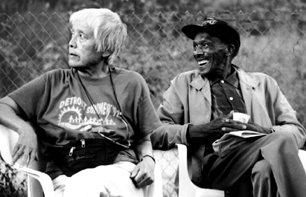I am back in Singapore visiting family and the 中国热 aka China craze, is like a whirlwind taking me by shock!
I suppose it shouldn't be surprising. There's the Olympics going on in Beijing, and everyone is gushing about how it heralds in a New China, one that is palatable and friendly to the West, even as it maintains its own character and history.
There's the movie, Mad About English, that was recently released. For all its faults -- a middle-class,
urban, Beijing set-up as an allegory of a widespread Chinese sensibility -- it is nonetheless difficult to imagine that the optimism that is expressed in the film is an isolated event. It is hard to imagine the squatters in Beijing, or the factory, domestic or restaurant workers, having the sense that their own upward mobility lies in learning English. However, there is also a sense that the rising tide raises all -- especially in the way the city carries itself.
It is this same optimism that I feel when I am in Singapore. I heard from the grapevine that increasingly, non-Chinese kids, like Malay and Indian kids are growing up today are learning to speak Mandarin as their second language. It used to be that we had to learn our own ethnic languages. Now, more non-Chinese are joining into the Chinese fad.
The dichotomy of cultural assimilation vs cultural nationalism, defined by people of colors' affinity to "Western" cultures and languages, is really insufficient in explaining what is being portrayed in the movie, "Mad About English." In the movie, you see old and young alike, rushing to learn English, but as a nationalist phenomena. Like Lee Yang, the "crazy English teacher,who conducts his classes like a pastor would in a mega church, says, learning English is not a way to worship the West, it is to learn the method of the West and use it for China. The way he inspires his young students pulls on very Confucian messages that are tied at the hip to upward mobility -- learning English, succeeding, earning money are all a means to express filial piety to your family. This message, I think, is what differentiates it from the modernist thrust of the May 4th Movement a century ago. Unlike the May 4th, which also expounded a similar message of using the tools of the West to exert Chinese nationalism, Lee Yang's fiery brand of nationalism doesn't inspire to strip China down to an image of the West. If anything, it has strands of essentialism, believing that Chinese culture and tradition will not lose its essence from time to come, and will absorb English into its fold. In other words, it is approaching English from a position of cultural and economic strength, not the weakness of a semi-colonized, divided China. English, in this context, becomes an Asian, if not Chinese, language, to reflect the strengthening and resurgence of Chinese nationalist identity.
Of course, this sense of optimism is one side of the story. As crowds rejoice around the Olympics, kindling a sense of Chinese revivalism, its easy to forget that it was built on the destruction of many Beijing homes. Homes of everyday working people are demolishes to ignite a sense of wonder for the Western tourist. It is plain and simple like this. There is nothing glorious or new about it; it is another facade of neo-colonialism and class oppression.
How does this translate to in Singapore? It is all a delicate game here. A rising sense of China fervor, alongside a sense of a crumbling US empire, and a sense of competing Islamic politics in nearby Indonesia and Malaysia; these tensions are constantly in play with one another. For countries in Southeast Asia, which are so interconnected to one another, and dependent on how the bigwigs play, the proximity of these world happenings are uncannily different from how it feels in the big US of A. But this would be another post. For now, here's the youtube of Mad About English!
8/20/2008
Subscribe to:
Post Comments (Atom)





No comments:
Post a Comment